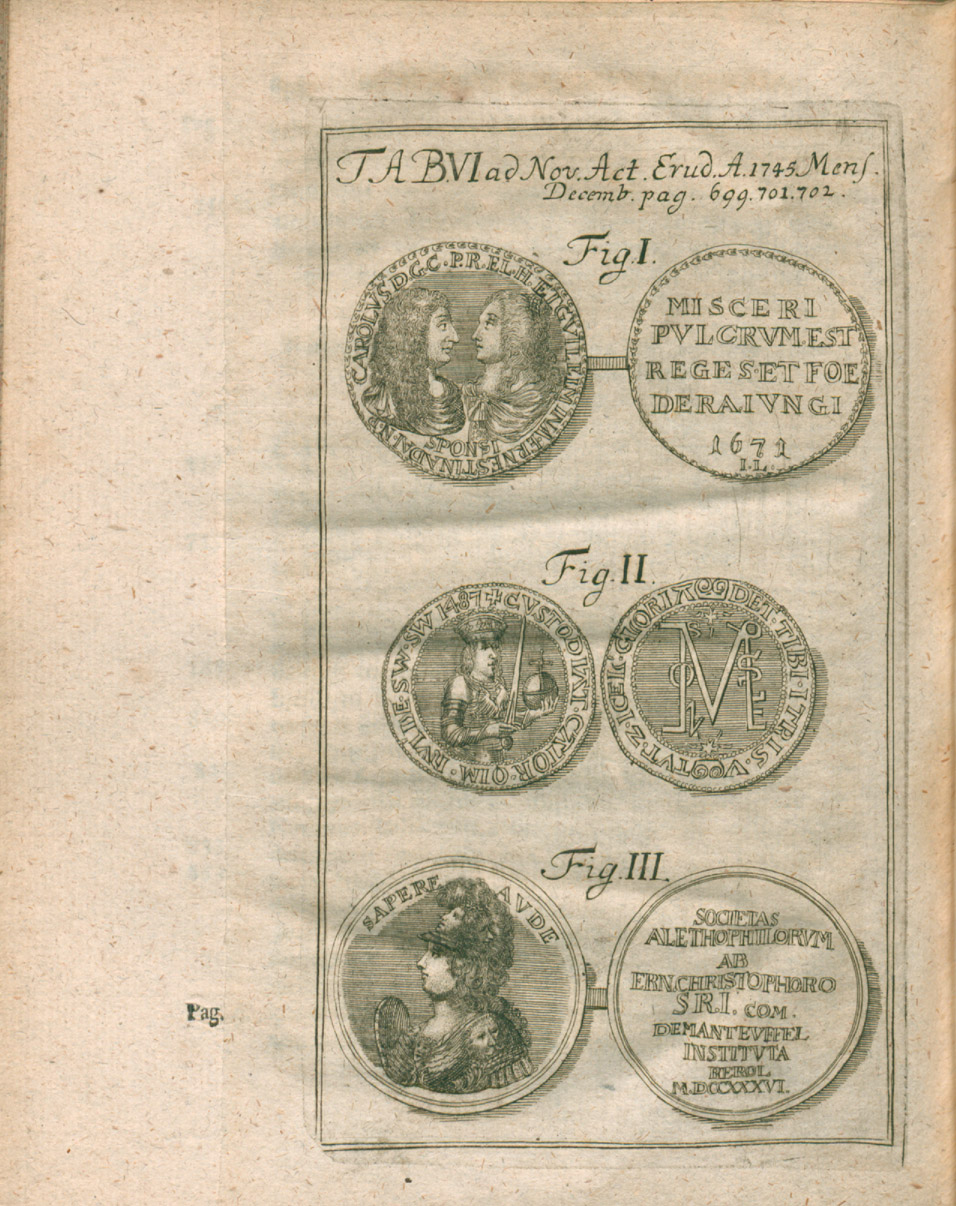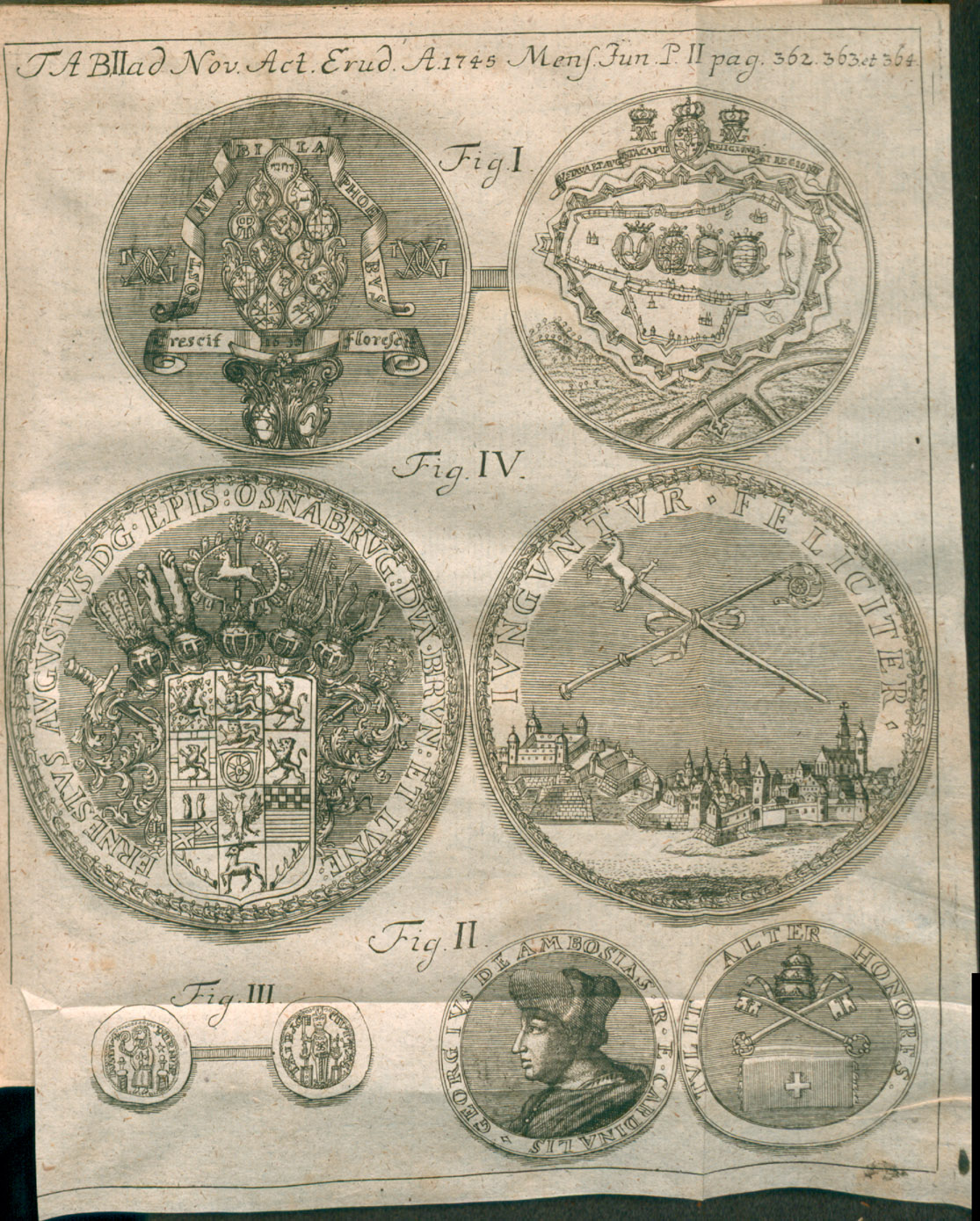Johann David Köhler on:
[Wikipedia]
[Google]
[Amazon]
Johann David Köhler (18 January 1684 – 10 March 1755) was a German


 Finally, Köhler published a scholarly journal on Roman coins and
Finally, Köhler published a scholarly journal on Roman coins and
Hathi Trust
Works by Köhler {{DEFAULTSORT:Kohler, Johann David 1684 births 1755 deaths People from Colditz German numismatists German classical scholars People from the Electorate of Saxony University of Wittenberg alumni University of Altdorf faculty University of Göttingen faculty German genealogists German male non-fiction writers
historian
A historian is a person who studies and writes about the past and is regarded as an authority on it. Historians are concerned with the continuous, methodical narrative and research of past events as relating to the human race; as well as the st ...
. His academic focuses were on Roman coins
Roman currency for most of Roman history consisted of gold, silver, bronze, orichalcum and copper coinage. From its introduction to the Republic, during the third century BC, well into Imperial times, Roman currency saw many changes in form, de ...
as historical artifacts, ancient weapons, and genealogy
Genealogy () is the study of families, family history, and the tracing of their lineages. Genealogists use oral interviews, historical records, genetic analysis, and other records to obtain information about a family and to demonstrate kins ...
. Köhler also served as university librarian at Altdorf and contributed to the early library science
Library science (often termed library studies, bibliothecography, and library economy) is an interdisciplinary or multidisciplinary field that applies the practices, perspectives, and tools of management, information technology, education, and ...
literature.
Life
Köhler was born inColditz
Colditz () is a small town in the district of Leipzig, in Saxony, Germany. It is best known for Colditz Castle, the site of the Oflag IV-C POW camp for officers in World War II.
Geography
Colditz is situated in the Leipzig Bay, southeast of the ...
in the Electorate of Saxony
The Electorate of Saxony, also known as Electoral Saxony (German: or ), was a territory of the Holy Roman Empire from 1356–1806. It was centered around the cities of Dresden, Leipzig and Chemnitz.
In the Golden Bull of 1356, Emperor Charl ...
and studied at the University of Wittenberg
Martin Luther University of Halle-Wittenberg (german: Martin-Luther-Universität Halle-Wittenberg), also referred to as MLU, is a public, research-oriented university in the cities of Halle and Wittenberg and the largest and oldest university in ...
. He was a professor of logic and history at universities in Altdorf and later Göttingen
Göttingen (, , ; nds, Chöttingen) is a college town, university city in Lower Saxony, central Germany, the Capital (political), capital of Göttingen (district), the eponymous district. The River Leine runs through it. At the end of 2019, t ...
and served briefly as university librarian at Altdorf. He died in Göttingen.
Influence
Köhler came into scholarly prominence in a transitional period for European scholarship. From theMiddle Ages
In the history of Europe, the Middle Ages or medieval period lasted approximately from the late 5th to the late 15th centuries, similar to the post-classical period of global history. It began with the fall of the Western Roman Empire ...
and into the Enlightenment, Europe
Europe is a large peninsula conventionally considered a continent in its own right because of its great physical size and the weight of its history and traditions. Europe is also considered a subcontinent of Eurasia and it is located enti ...
an scholars
A scholar is a person who pursues academic and intellectual activities, particularly academics who apply their intellectualism into expertise in an area of study. A scholar can also be an academic, who works as a professor, teacher, or researche ...
were part of a "common culture of scholarship", a ''respublica litteraria'' (Eskildsen 2005: 421). That common culture of scholarship was subjected to a series of nationalistic and religious pressures across the eighteenth century so that as Köhler came into prominence in the eighteenth century, there had been a shift from the pan-European imagined community to a more parochial nationalist one (Anderson 1991).
His credentials as a library and information scientist are based upon three of his monographs: ''Syllogie aliquot Scriptorum de bene ordinanda et ornanda Bibliotheca'', published in 1728; ''Hochverdiente und aus bewährten Urkunden wohlbeglaubte Ehren-Rettung Johann Guttenbergs, eingebohrnen Bürgers in Mayntz'' in 1741; and ''Anweisung für reisende Gelerte, Bibliothecken, Münz-Cabinette, Antiquitäten-Zimmer, Bilder-Sale, Naturalien- und Kunst-Kammern, u.d.m mit Nutzen zubesehen'' from 1762. The 1728 ''Syllogie…'' is a bibliographic examination of major history texts of the day and is in keeping with the role of historians then and now. The 1741 ''Hochverdiente…'' is an examination of the assertion that Johann Gutenberg was indeed the inventor of movable type
Movable type (US English; moveable type in British English) is the system and technology of printing and typography that uses movable components to reproduce the elements of a document (usually individual alphanumeric characters or punctuatio ...
– the printing press
A printing press is a mechanical device for applying pressure to an inked surface resting upon a print medium (such as paper or cloth), thereby transferring the ink. It marked a dramatic improvement on earlier printing methods in which the ...
– against competing claims. Bernhard von Mallinckrodt (1591-1664) is credited with writing the first defense of Gutenberg as the inventor of the printing press in 1639 (Schmidmaier 2001), but Köhler is said to have authored second and definitive defense (Eck 2000). Köhler's third and most important work within this context is the 1792 ''Anweisung für reisende Gelerte, Bibliothecken, Műnz-Cabinette, Antiquitäten-Zimmer, Bilder-Sale, Naturalien und Kunst-Kammern, u.d.m mit Nutzen zubesehen.''


 Finally, Köhler published a scholarly journal on Roman coins and
Finally, Köhler published a scholarly journal on Roman coins and numismatics
Numismatics is the study or collection of currency, including coins, tokens, paper money, medals and related objects.
Specialists, known as numismatists, are often characterized as students or collectors of coins, but the discipline also inclu ...
in general. His son Johann Tobias Köhler continued that interest. This journal is important to library science in that it is among the first true serials ever published.
Works
* ''Orbis terrarum in nuce, sive Compendium historiae civilis chronologicum in sculptura memoriali'' * 1719: ''Bequemer Schul- und Reise-Atlas''. Nürnberg: Christoph Weigel * 1724: ''Anleitung zu der verbesserten neuen Geographie, vornemlich zum Gebrauch der Weigelschen Landcharten''. Nürnberg: Christoph Weigel * 1726: ''Genealogische Geschichte der Herren und Grafen von Wolfstein'' * 1730: ''Kurze und gründliche Anleitung zu der alten und mittleren Geographie''. Nürnberg: Christoph WeigelReferences
Karl Dziatzko
Karl Franz Otto Dziatzko (27 January 1842 - 13 January 1903, Göttingen) was a German librarian and scholar, born in Neustadt, Silesia.
s Wiederbelebung der Gutenbergforschung, Elmar Mittlers Digitalisierung der Göttinger Schlüsseldokumente zur Erforschung des Frühdrucks", in Köhler, Johann David (1741, reprint 2000), ''Hochverdiente und aus bewährten Urkunden wohlbeglaubte Ehren-Rettung Johann Guttenbergs, eingebohrnen Bürgers in Mayntz…'', with afterword by Reimer Eck. Munich: Saur, pp. 109–121.
*Eskildsen, Kaspar (2005) "How Germany Left the Republic of Letters", ''Journal of the History of Ideas
The ''Journal of the History of Ideas'' is a quarterly peer-reviewed academic journal covering intellectual history and the history of ideas, including the histories of philosophy, literature and the arts, natural and social sciences, religion, ...
'', vol. 65, 3, pp. 421–432.
*Schmidmaier, Dieter (2001) "Johann David Köhlers Verdienst", '' Bibliothek Forschung und Praxis'', vol. 25, 2, pp. 253–255
Further reading
* Michael Diefenbacher, Markus Heinz, Ruth Bach-Damaskinos: „auserlesene und allerneueste Landkarten“. Der Verlag Homann in Nürnberg 1702–1848. Nürnberg: Tümmels 2002, S. 52 * Johann Gabriel Doppelmayr: ''Historische Nachricht von den Nürnbergischen Mathematicis und Künstlern''. Nürnberg, 1730 Peter Conrad Monath * Georg Andreas Will: ''Nürnbergisches Gelehrtenlexikon Bd. 1''. Nürnberg: Lorenz Schüpfel 1755, S. 304-314 *Christian Gottlieb Jöcher
Christian Gottlieb Jöcher (20 July 1694 – 10 May 1758) was a German academic, librarian and lexicographer.
Jöcher was born in Leipzig, and became professor of history at the University of Leipzig
Leipzig University (german: Universität ...
:'' Allgemeines Gelehrten-Lexikon''. Fortsetzungen und Ergänzungen von J. C. Adelung. Bd. 3. 1810.
* Thomas Nicklas: "Johann David Köhler (1684–1755), Historiker". In: ''Fränkische Lebensbilder''; 16 (1996). S. 79—93.
* Thomas Nicklas: "Der Historiker Johann David Köhler (1684–1755) und die Geschichte des gräflichen Hauses Wolfstein". In: ''Verhandlungen des Historischen Vereins für Oberpfalz und Regensburg''; 135, 1995, S. 77—83.
* Detlev Hölscher: "Johann David Köhler, 1684-1755. Porträt eines bedeutenden Numismatikers des 18. Jahrhunderts". In: ''Münzen Revue''; 26, 1994, H. 6, S. 728-737.
External links
Hathi Trust
Works by Köhler {{DEFAULTSORT:Kohler, Johann David 1684 births 1755 deaths People from Colditz German numismatists German classical scholars People from the Electorate of Saxony University of Wittenberg alumni University of Altdorf faculty University of Göttingen faculty German genealogists German male non-fiction writers